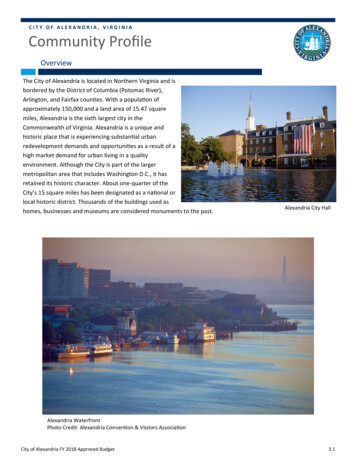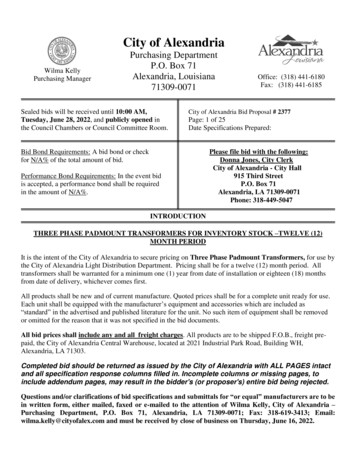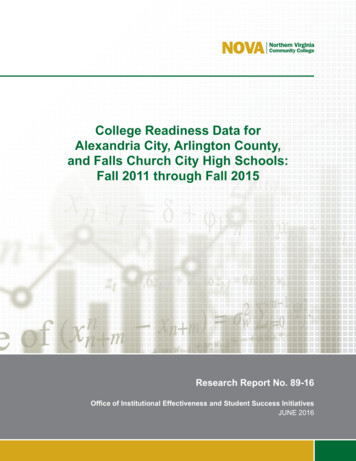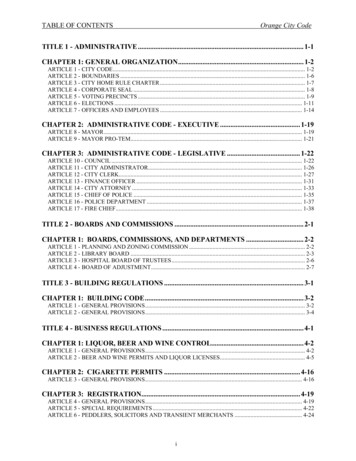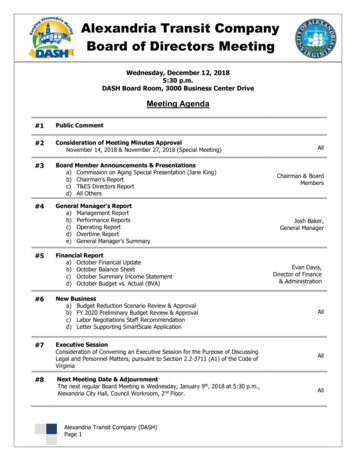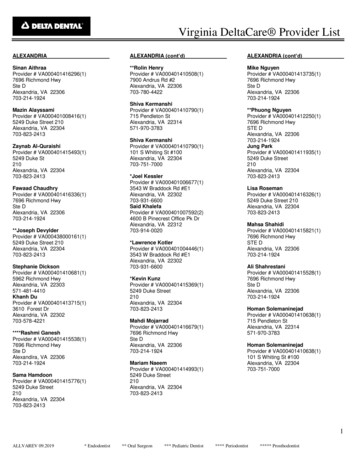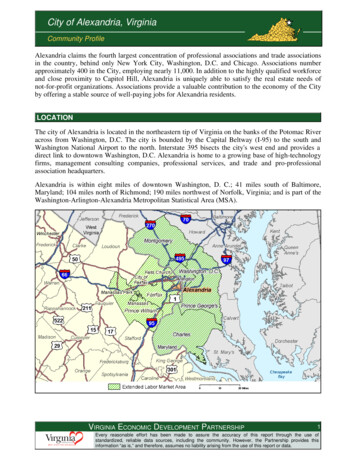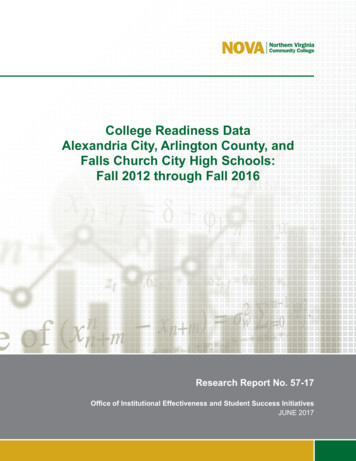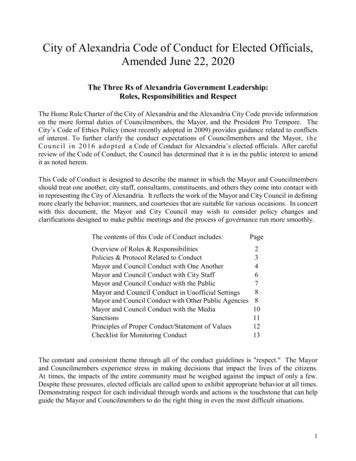
Transcription
City of Alexandria Code of Conduct for Elected Officials,Amended June 22, 2020The Three Rs of Alexandria Government Leadership:Roles, Responsibilities and RespectThe Home Rule Charter of the City of Alexandria and the Alexandria City Code provide informationon the more formal duties of Councilmembers, the Mayor, and the President Pro Tempore. TheCity’s Code of Ethics Policy (most recently adopted in 2009) provides guidance related to conflictsof interest. To further clarify the conduct expectations of Councilmembers and the Mayor, t h eC o u n c i l i n 2 0 1 6 a do p t e d a Code of Conduct for Alexandria’s elected officials. After carefulreview of the Code of Conduct, the Council has determined that it is in the public interest to amendit as noted herein.This Code of Conduct is designed to describe the manner in which the Mayor and Councilmembersshould treat one another, city staff, consultants, constituents, and others they come into contact within representing the City of Alexandria. It reflects the work of the Mayor and City Council in definingmore clearly the behavior, manners, and courtesies that are suitable for various occasions. In concertwith this document, the Mayor and City Council may wish to consider policy changes andclarifications designed to make public meetings and the process of governance run more smoothly.The contents of this Code of Conduct includes:Overview of Roles & ResponsibilitiesPolicies & Protocol Related to ConductMayor and Council Conduct with One AnotherMayor and Council Conduct with City StaffMayor and Council Conduct with the PublicMayor and Council Conduct in Unofficial SettingsMayor and Council Conduct with Other Public AgenciesMayor and Council Conduct with the MediaSanctionsPrinciples of Proper Conduct/Statement of ValuesChecklist for Monitoring ConductPage234678810111213The constant and consistent theme through all of the conduct guidelines is "respect." The Mayorand Councilmembers experience stress in making decisions that impact the lives of the citizens.At times, the impacts of the entire community must be weighed against the impact of only a few.Despite these pressures, elected officials are called upon to exhibit appropriate behavior at all times.Demonstrating respect for each individual through words and actions is the touchstone that can helpguide the Mayor and Councilmembers to do the right thing in even the most difficult situations.1
Overview of Roles & ResponsibilitiesOther resources that are helpful in defining the roles and responsibilities of elected officials are theHome Rule Charter of the City of Alexandria, Alexandria City Code, and League of Minnesota Citiesresources for elected officials, including the Handbook for Minnesota Cities and the MinnesotaMayors Handbook, among many other publications.MAYOR Elected “at-large” for a four year term (Note the Charter still calls for two year terms for theMayor and Council. The City Council passed a transitional ordinance in 1996 that resultedin four-year terms for the Mayor and City Council) Presiding officer of the council (Alexandria City Charter, Section 2.03, Subd. 1) Chief Executive Officer of the City (Alexandria City Charter, Section 2.03, Subd. 1) Votes in the event of a tie vote by the City Council (Alexandria City Charter, Section 2.02,Subd. 1) Holds veto power (Alexandria City Charter, Section 2.03, Subd. 2) Executes and authenticates ordinances and resolutions (Alexandria City Charter, Section3.03 and 3.05) Leads the Council into an effective, cohesive working teamPRESIDENT PRO-TEMPORE Elected by the City Council at their first meeting i n J a n u a r y o f e a c h y e a r(Alexandria City Charter, Section 2.03, Subd. 1) Performs the duties of the Mayor if the Mayor is absent or disabled (Alexandria City Charter,Section 2.03, Subd. 1)ALL COUNCIL MEMBERSAll members of the City Council, including president pro tempore, have equal votes. NoCouncilmember has more power than any other Councilmember, and all should be treated with equalrespect.All Councilmembers should: Fully participate in City Council meetings and other public forums while demonstratingrespect, kindness, consideration, and courtesy to others Prepare in advance of meetings and be familiar with issues on the agenda Represent the City at ceremonial functions at the request of the Mayor Be respectful of other people’s time Stay focused and act efficiently during public meetings. Serve as a model of leadership and civility to the community Inspire public confidence in Alexandria government Demonstrate honesty and integrity in every action and statement Participate in scheduled activities2
Policies & Protocol Related To ConductCeremonial EventsRequests for a City representative at ceremonial events will be directed to the Mayor. The Mayorwill serve as the designated City representative. If the Mayor is unavailable, the Mayor willdetermine if event organizers would like another representative from the Council. If yes, then thePresident Pro Tempore will be recommended to serve as the substitute. Invitations received at CityHall are presumed to be for official City representation.Correspondence SignaturesThe Mayor and Councilmembers do not need to acknowledge the receipt of correspondence relatingto City business, or copies of such correspondence, during Council meetings. City staff will prepareofficial letters in response to public inquiries and concerns. These letters will carry the signature ofthe Mayor or the appropriate City staff. If correspondence is addressed only to the Mayor or to oneCouncilmember, that correspondence will be shared with the rest of the Council.Endorsement of Candidates and Ballot InitiativesThe Mayor and Councilmembers have the right to endorse candidates for all Council seats, otherelected offices, and ballot initiatives by other government bodies. It is inappropriate to i n c l u d es u c h i t e m s o n a n y C o u n c i l a g e n d a o r t o mention t h o s e endorsements during Councilmeetings or other official City meetings or functions.Intergovernmental RelationsThe Mayor and Council value intergovernmental relations with neighboring communities and otherentities. As a result, the Mayor and Councilmembers should make a concerted effort to attendscheduled meetings with other entities to further promote intergovernmental relations.Legislative ProcessThe procedural rules adopted by the City Council will be the governing guide for councilproceedings.Public Meeting Hearing ProtocolThe Mayor will determine the meeting protocol on a case-by-case basis, taking into accountany legally-required protocols that may apply in certain circumstances. Generally, theMayor will open the public hearing, and staff will then make an initial presentation. After thestaff pres entation , the applicant or appellant, if any, shall be given the opportunity to speak first,followed by those with opposing views. In situations where there is no applicant or appellant,members of the public will be invited to speak in any order deemed appropriate by the Mayor. Ifdeemed necessary by the Mayor, any speaker who has already spoken may be given the opportunityto respond to comments made by others. The Mayor has the responsibility to run an efficientpublic meeting and has the discretion to modify the public hearing process in order to make themeeting run smoothly. This includes determining how much time will be allowed for each speaker,with 3 to 5 minutes the standard time granted. The Mayor may also limit presentations of viewpointsthat are repetitive of comments that have already been made and may exclude any person whoexhibits disorderly conduct or other inappropriate or unlawful behavior. The Mayor may ask theCouncil if any issues need clarification before the public hearing is closed. The Mayor and3
Councilmembers will not express opinions during the public hearing portion of the meetingexcept to ask pertinent questions of the speaker or staff. "I think" and "I feel" comments by theMayor and Councilmembers are not appropriate until after the close of the public hearing. The Mayorand Councilmembers should refrain from arguing or debating with the public during a public hearingand shall always show respect for different points of view. Once the Mayor is satisfied that allinformation that could be gathered during the public hearing has been gathered, the Mayor shall closethe public hearing and resume the Council meeting.EEO, Discrimination, Harassment and Respectful WorkplaceThe Mayor and all councilmembers shall be familiar with and adhere to the City’s equal employmentopportunity, discrimination, sexual and other harassment and respectful workplace policies.Mayor and Council Conduct with One AnotherCouncils are composed of individuals with a wide variety of backgrounds, personalities, values,opinions, and goals. Despite this diversity, all have chosen to serve in public office in order topreserve and protect the present and the future of the community. In all cases, this common goalshould be acknowledged even as the Mayor and Council may "agree to disagree" on contentiousissues.IN PUBLIC MEETINGS Practice civility, professionalism and decorum in discussions and debateDifficult questions, tough challenges to a particular point of view, and criticism of ideas andinformation are legitimate elements of a free democracy in action. This does not allow, however, theMayor and Councilmembers to make belligerent, personal, impertinent, slanderous, threatening,abusive, or disparaging comments. No shouting or physical actions that could be construed asthreats will be tolerated. The Mayor and Councilmembers should conduct themselves in aprofessional manner at all times. Honor the role of the Mayor in maintaining orderIt is the responsibility of the Mayor to keep the comments of Councilmembers on track during publicmeetings. Councilmembers should honor efforts by the Mayor to focus discussion on currentagenda items. If there is disagreement about the agenda or the Mayor’s actions, those objectionsshould be voiced politely and with reason, following procedures outlined in the procedural rulesadopted by the Council. Avoid personal comments that could offend other CouncilmembersIf a Councilmember is personally offended by the remarks of another Councilmember, the offendedCouncilmember should note their concerns during the meeting and make notes of the actual wordsused and follow the Council’s procedural rules to request the other Councilmember to justify orapologize for the language used. The Mayor will maintain control of this discussion.4
Demonstrate effective problem-solving approachesThe Mayor and Councilmembers have a public stage to show how individuals with disparate pointsof view can find common ground and seek a compromise that benefits the community as a whole. Be punctual and keep comments relative to topics discussedThe Mayor and Councilmembers have made a commitment to attend meetings and participate indiscussions. Therefore, it is important that the Mayor and Councilmembers be punctual and thatmeetings start on time. It is equally important that discussions on issues be relative to the topicat hand to allow adequate time to fully discussed scheduled issues.IN PRIVATE ENCOUNTERS Continue respectful behavior in privateThe same level of respect and consideration of differing points of view that is deemedappropriate for public discussions should be maintained in private conversations. Be aware of the insecurity of written notes, voicemail messages, e-mail, text messages,“tweets,” and social mediaTechnology allows words written or said without much forethought to be distributed wide andfar. Before recording or putting something in writing, consider: Would you feel comfortable to have this note faxed to others?How would you feel if this voicemail message was played on a speaker phone in a fulloffice?What would happen if this e-mail or text message was forwarded to others?How would you feel if this comment, image, video, “tweet,” or social media postwent “viral” for the world to see and read?Written notes, voicemail messages, email and social media posts should be treated aspotentially "public" communication. It is the responsibility of the City Council to be awareof and follow the City’s Data Practices Policy and the Minnesota Government Data PracticesAct (“MGDPA”).If the communication is between Councilmembers, could this conversation or writtenexchange, including emails, text messages, and other forms of electronic communicationviolate Minnesota’s Open Meetings Law? Even private conversations can have a public presenceElected officials are always on display – their actions, mannerisms, and language are monitored bypeople around them that they may not know. Lunch table conversations will be eavesdropped upon,parking lot debates and arguments will be watched, and casual comments between individualsbefore and after public meetings noted. Before Council meetings are opened and after they areclosed, Councilmembers should avoid any pre- and post-meeting discussions amongst themselves,as such conversations could violate Minnesota’s Open Meetings Law, or at least be perceived as aviolation.5
Mayor and Council Conduct with City StaffGovernance of a City relies on the cooperative efforts of elected officials, who set policy, and Citystaff, who implement and administer the Council’s policies. Therefore, every effort should be madeto be cooperative and show mutual respect for the contributions made by each individual forthe good of the community. Treat all staff as professionalsClear, honest communication that respects the abilities, experience, and dignity of eachindividual is expected. Poor behavior towards staff is not acceptable. Limit contact to specific City staffQuestions of City staff and/or requests for additional background information should be directed tothe City Administrator, Mayor, or Department Heads. The City Administrator should be copied onor informed of any request.Requests for follow-up or directions to staff should be made only through the City Administrator.When in doubt about what staff contact is appropriate, Councilmembers should ask the CityAdministrator or Mayor for direction. Materials supplied to a Councilmember in response to arequest will be made available to the Mayor and all members of the Council so that all have equalaccess to information. Do not disrupt City staff from their jobsThe Mayor and Councilmembers should not disrupt City staff while they are in meetings, on thephone, or engrossed in performing their job functions in order to have their individual needs met.As a matter of courtesy and effective time management, Councilmembers should scheduleappointments with staff in advance. Never publicly criticize an individual employeeThe Mayor and Council should never express concerns about the performance of a City employeein public, to the employee directly, or to the employee’s manager. Comments about staffperformance should only be made to the City Administrator through private correspondence orconversation. Councilmembers must respect the City’s employees’ right to data privacy under theMGDPA. Do not get involved in administrative functionsThe Mayor and Councilmembers must not attempt to influence City staff on the making ofappointments, awarding of contracts, selecting of consultants, processing of developmentapplications, or granting of City licenses and permits. Check with City staff on correspondence before taking actionBefore sending correspondence, the Mayor and Councilmembers should check with City staff tosee if an official City response has already been sent or is in progress. Do not attend meetings with City staff unless requested by staff.Even if the Mayor and/or Councilmember does not say anything, the Mayor and/orCouncilmember’s presence implies support, shows partiality, intimidates staff, and hampers staff’s6
ability to do their job objectively. Limit requests for staff supportRequests for additional staff support – even in high priority or emergency situations – should bemade to the City Administrator who is responsible for allocating City resources in order to maintaina professional, well-run City government. Do not solicit political support from staffThe Mayor and Councilmembers should not solicit any type of political support (financialcontributions, display of posters or lawn signs, name on support list, etc.) from City staff. Citystaff may, as private citizens with constitutional rights, support political candidates but all suchactivities must be done away from the workplace.Mayor and Council Conduct with the PublicIN PUBLIC MEETINGSMaking the public feel welcome is an important part of the democratic process. No signs ofpartiality, prejudice or disrespect should be evident on the part of the Mayor or individualCouncilmembers toward an individual participating in a public forum. Every effort should be madeto be fair and impartial in listening to public testimony or comment. Be welcoming to speakers and treat them with care and gentlenessSpeaking in front of the Mayor and Council can be a difficult experience for some people. Someissues the Council undertakes may affect people’s daily lives and homes. Some decisions areemotional. The way that the Mayor and Council treats people during public hearings can do a lotto make them relax or to push their emotions to a higher level of intensity. Deescalating a situationwill lead to a more productive outcome for all involved and the community as whole. Give the appearance of active listeningIt is disconcerting to speakers to have the Mayor and Council members not look at themwhen they are speaking. It is fine to look down at documents or to make notes, but reading for along period of time or gazing around the room gives the appearance of disinterest. Be aware offacial expressions, especially those that could be interpreted as "smirking," disbelief, anger orboredom. Ask for clarification, but avoid debate and argument with the publicOnly the Mayor – not individual Councilmembers – may interrupt a speaker during a presentation.However, using the Council’s rules of procedure, a Councilmember may ask the Mayor to addressthe situation if the speaker is off the topic or exhibiting behavior or language the Councilmemberfinds disturbing.If speakers become flustered or defensive by Council questions, it is the responsibility of the Mayorto calm and focus the speaker and to maintain the order and decorum of the meeting. Questions byCouncilmembers to members of the public testifying should seek to clarify or expand information.It is never appropriate to belligerently challenge or belittle the speaker. Council members’ personalopinions or inclinations about upcoming votes should not be revealed until after the public7
hearing is closed. No personal attacks of any kind, under any circumstanceThe Mayor and Councilmembers should be aware that their body language and tone of voice, aswell as the words they use, can appear to be intimidating or aggressive. Follow the Council’s rules of procedure in conducting public meetingsThe City Attorney serves as advisory parliamentarian for the City and is available to answerquestions or interpret situations according to the Council’s rules of procedure. Final rulings onprocedural issues are made by the Mayor, subject to the Council’s rules of procedure.MAYOR AND COUNCIL CONDUCT IN UNOFFICIAL SETTINGS Make no promises on behalf of the CouncilThe Mayor and Councilmembers will frequently be asked to explain a Council action or to givetheir opinion about an issue as they meet and talk with constituents in the community. It isappropriate to express personal feelings or positions on an issue or to give a brief overview of Citypolicy and to refer to City staff or Council for further information. It is inappropriate to overtly orimplicitly promise Council action, or to promise City staff will do something specific (fix a pothole,remove a library book, plant new flowers, approve a license or permit, install a traffic sign, etc.). Make no personal comments about the Mayor or other CouncilmembersIt is acceptable to publicly disagree about an issue, but it is unacceptable to make derogatorycomments about the Mayor or other Councilmembers, their opinions and actions. Remember that despite its continued growth, Alexandria is a small community at heartThe Mayor and Councilmembers are constantly being observed by the community every day thatthey serve in office. Their behaviors and comments serve as models for proper deportment inthe City of Alexandria. Honesty and respect for the dignity of each individual should be reflectedin every word and action taken by t h e M a yor and Councilmembers, 24 hours a day, sevendays a week. It is a serious and continuous responsibility.Mayor and Council Conduct with Other Public Agencies Be clear about representing the City or personal interestsIf the Mayor or a Councilmember appears before another governmental agency or organization togive a statement on an issue, the Mayor or Councilmember must clearly state:1) If his or her statement reflects personal opinion or is the official stance of the City;2) Whether this is the majority or minority opinion of the Council, if the Council has taken aposition on the matter. Even if the Mayor or Councilmember is representing his or her ownpersonal opinions, remember that this still may reflect upon the Council as an organizationand the City as a whole.If the M a yo r o r Councilmember is representing the City, the M a yo r o r Councilmember mustsupport and advocate the official City position on an issue, not a personal viewpoint even if theCouncilmember may personally disagree with the City’s official position.8
If the Mayor or Councilmember is representing another organization whose position is differentfrom the City, the Mayor or Councilmember should withdraw from voting on the issue if itsignificantly impacts or is detrimental to the City’s interest. The Mayor and Councilmembersshould be clear about which organizations they represent and inform the Mayor and Council of theirinvolvement. Correspondence also should be equally clear about representationCity letterhead may be used when the Mayor or Councilmember is representing the City and theCity’s official position. A copy of official correspondence should be given to the City Administratorto be filed as part of the permanent public record.City letterhead may not be used for correspondence of the Mayor and Councilmembers representinga personal point of view, or a dissenting point of view from an official Council position.Mayor and Council Conduct with Boards, Committees andCommissionsThe City has established several Boards, Committees, and Commissions as a means of gatheringmore community input. Citizens who serve on Boards and Commissions become more involved ingovernment and serve as advisors to the Mayor and City Council. They are a valuable resource tothe City’s leadership and should be treated with appreciation and respect. If attending a Board or Commission meeting of which the Councilmember is not a member,be careful to only express personal opinions The Mayor and Councilmembers may attend anyBoard or Commission meeting, which are always open to any member of the public. However, ifthe Board or Commission is conducting a public hearing, the Mayor or Councilmember shallremove themselves from the proceedings. The Mayor and Councilmembers should be sensitive tothe way their participation – especially if it is on behalf of an individual, business or developer –could be viewed as unfairly affecting the process. Any public comments by the Mayor or aCouncilmember at a Board or Commission meeting should be clearly made as individual opinionand not a representation of the feelings of the entire City Council. Also, the Mayor or aCouncilmember’s presence may affect the conduct of the Board or Commission and limit their roleand function. In addition, Councilmembers must be cognizant of how their presence impacts anypotential quorum of the Council and, therefore, the resulting implications under Minnesota's OpenMeeting Law. Limit contact with Board and Commission membersIt is inappropriate for the Mayor or a Councilmember to contact a Board or Commission memberto lobby on behalf of an individual, business, or developer. The Mayor and Councilmembersshould contact staff in order to clarify a position taken by the Board or Commission. Remember that Boards and Commissions serve the community, not the Mayor orindividual CouncilmembersThe Mayor and City Council appoint individuals to serve on Boards and Commissions, and it is the9
responsibility of Boards and Commissions to follow policy established by the Council. ButBoard and Commission members do not report to the Mayor or individual Councilmembers, norshould the Mayor or Councilmembers feel they have the power or right to threaten Board andCommission members with removal if they disagree about an issue. Appointment and reappointment to a Board or Commission should be based on such criteria as expertise, ability towork with staff and the public, and commitment to fulfilling official duties. A Board orCommission appointment should not be used as a political "reward." Be respectful of diverse opinionsA primary role of Boards and Commissions is to represent many points of view in thecommunity and to provide the Mayor and Council with advice based on a full spectrum of concernsand perspectives. The Mayor and Councilmembers must be fair and respectful of all citizensserving on Boards and Commissions. Keep political support away from public forumsBoard and Commission members may offer political support to the Mayor or a Councilmember, butnot in a public forum while conducting official duties. Conversely, the Mayor or Councilmembersmay support Board and Commission members who are running for office, but not in an officialforum in their capacity as the Mayor or a Councilmember. Inappropriate behavior can lead to removalInappropriate behavior by a Board or Commission member should be noted to the Mayor, andthe Mayor should counsel the offending member. If inappropriate behavior continues, the Mayorshould bring the situation to the attention of the Council which shall decide the appropriate action,which may include removal from the Board or Commission.Mayor and Council Conduct with the MediaThe Mayor and Councilmembers may be contacted by the media for background and quotes. The best advice for dealing with the media is to never go "off the record"Most members of the media represent the highest levels of journalistic integrity and ethics, and canbe trusted to keep their word. But one bad experience can be catastrophic. Words that are notsaid cannot be quoted. Words that are said cannot be unsaid. The Mayor is the official spokesperson for the representative on City positionThe Mayor is the designated representative of the Council to present and speak on the officialCity position. If an individual Councilmember is contacted by the media, the Councilmembershould be clear about whether their comments represent the official City position or a personalviewpoint. Choose words carefully and cautiouslyComments taken out of context can cause problems. Be especially cautious about humor, sardonicasides, sarcasm, c u r s i n g or word play. When talking to the media, consider the same issuesnoted in the In Private Encounters section above.10
Sanctions Public DisruptionMembers of the public who do not follow proper conduct after a warning in a public hearing maybe barred from further testimony at that meeting or removed from the Council Chambers. Inappropriate Staff BehaviorCouncil members should refer to the City Administrator any City staff who do not follow properconduct in their dealings with Council members, other City staff, or the public. These employeesmay be disciplined in accordance with standard City procedures for such actions. Council members Behavior and ConductThe Mayor or City Council members who intentionally and repeatedly do not follow proper conductmay be reprimanded or formally censured by the Council. Serious infractions of the Code ofEthics or Code of Conduct could lead to other sanctions as deemed appropriate by Council.1. If the Mayor or a Councilmember believes that another Councilmember or the Mayor hasviolated this Code of Conduct or the City’s Code of Ethics during a meeting of the Council,s/he should call the matter to the offending person’s attention at that or a subsequent Councilmeeting. If the problem continues, it shall be referred to the Mayor (or the President ProTempore if the complaint is against the Mayor) who will attempt to resolve the matter inprivate. If the dispute is between the Mayor and the President Pro Tempore, the Councilshall select one of its other members to attempt to privately resolve the matter. The Mayor(or President Pro Tempore or Council’s designee, if any) may involve the City Administratorand/or City Attorney to investigate and make recommendations about the dispute. If theseprivate efforts do not resolve the matter, then the Mayor or any member or the Council maybring it before the Council at a duly noted public meeting, at which time the Council shalldecide whether or not to proceed with further action as noted in section 3 below.2. If the Mayor or a Councilmember believes that another Councilmember or the Mayor hasviolated this Code of Conduct or the City’s Code of Ethics at a time other than a meeting ofthe Council, s/he should call the matter to the offending person’s attention and attempt toresolve it privately. If the problem is not resolved or continues after that informal discussion,it may be called to the attention of the Mayor (or the President Pro Tempore if it is theMayor’s actions that are being challenged) who shall attempt to privat
Elected "at-large" for a four year term (Note the Charter still calls for two year terms for the Mayor and Council. The City Council passed a transitional ordinance in 1996 that resulted in four-year terms for the Mayor and City Council) Presiding officer of the council (Alexandria City Charter, Section 2.03, Subd. 1)
